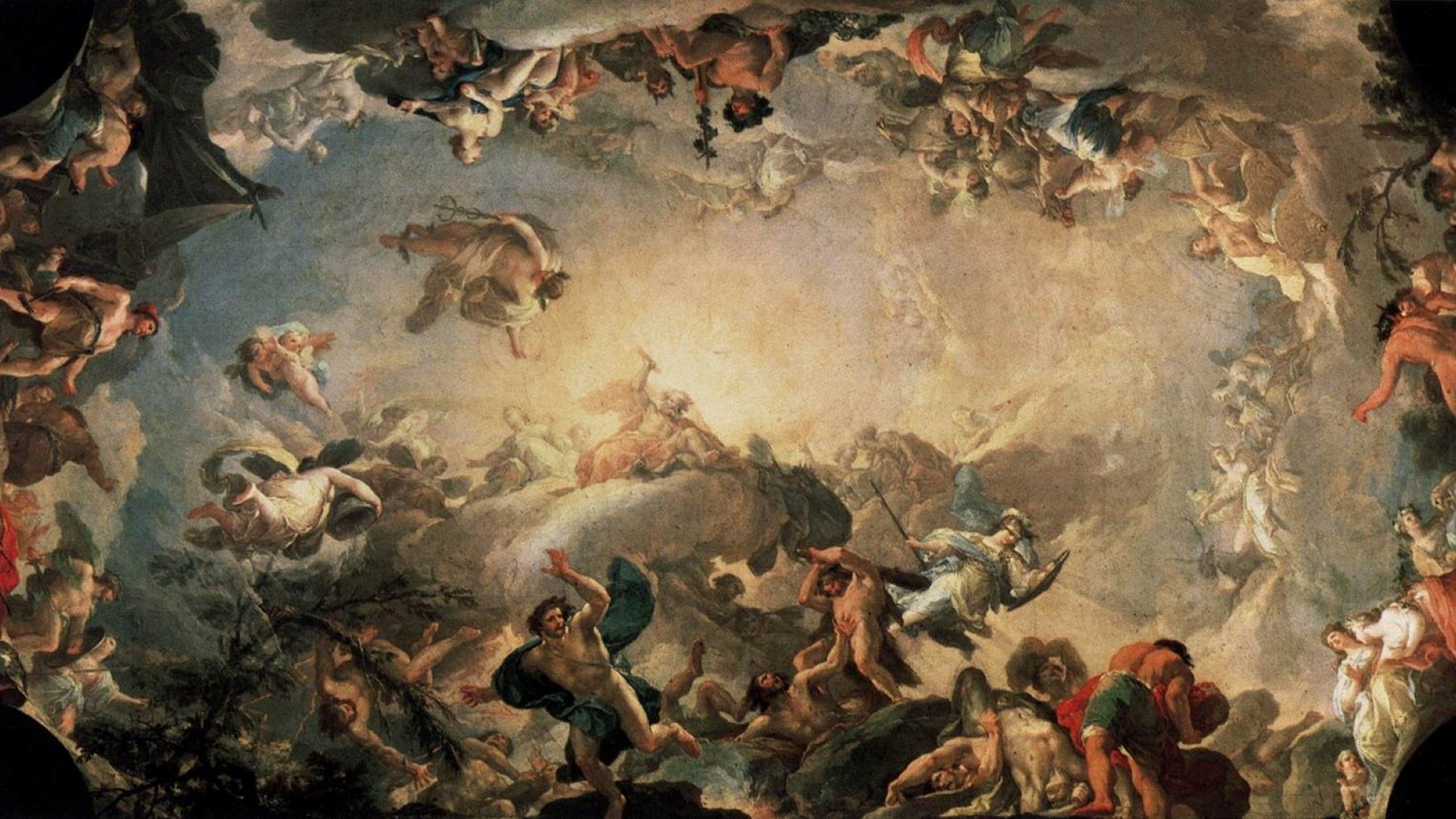
Penthesilea
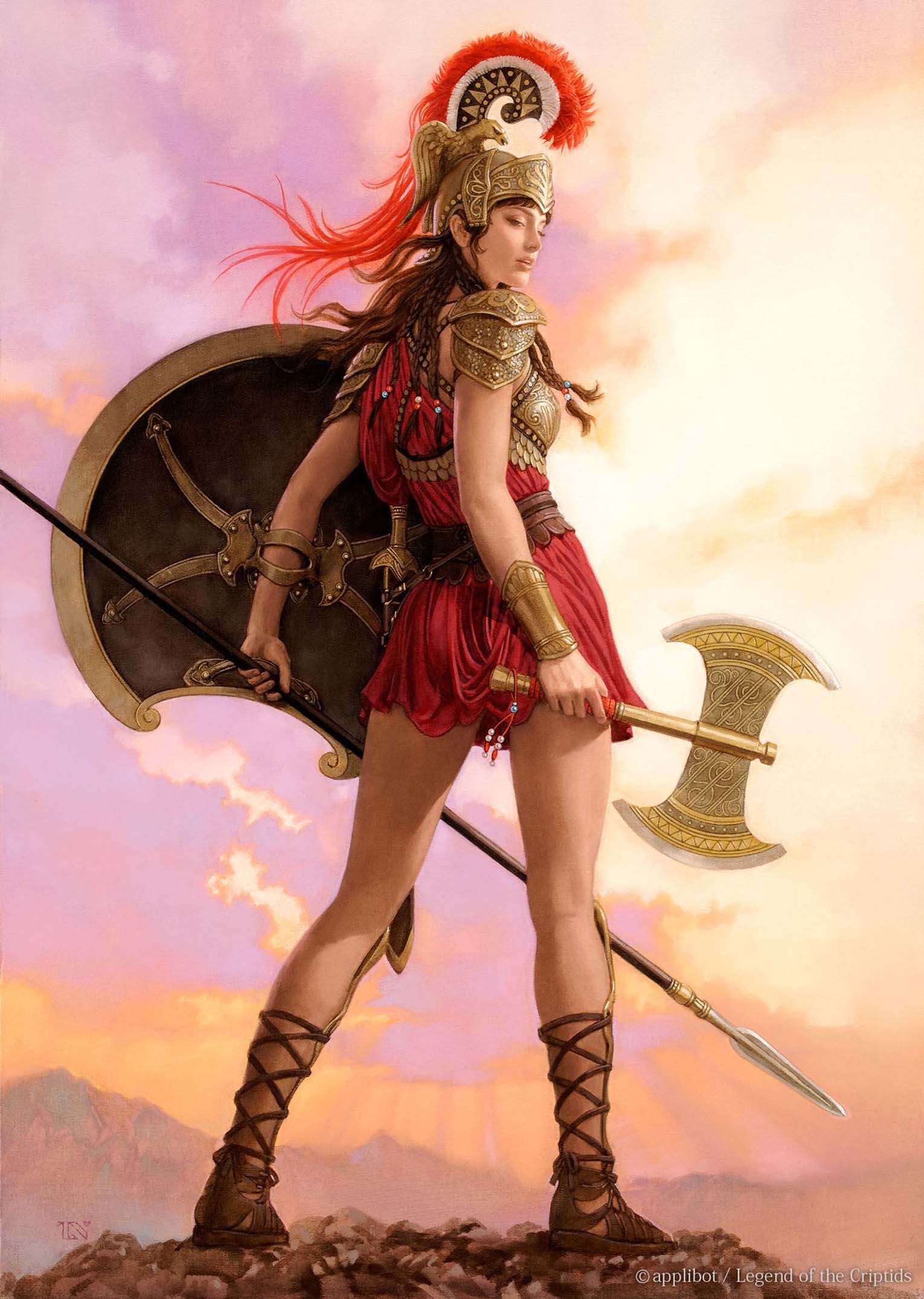
Penthesilea was an Amazonian Queen from Greek mythology. She was the daughter of Ares and Otrera and the sister of Hippolyta, Antiope and Melanippe. One of many famous Amazonian Queens, Penthisilea’s story is one of fierce dedication to being a warrior, and a tragic death at the hands of Achilles.
As an Amazon, Penthesilea was a member of a legendary race of warrior women. The Amazon women were so dedicated to being warriors, that they were known to cut off one of their breasts so that they would be better able to wield a bow. Whether this is true or not is debatable.
Penthesilea was highly skilled with weapons, she was very wise, and she was beautiful. It has been said that she invented the battle-axe. While hunting one day, Penthesilea accidentally killed her sister Hippolyta with a spear. This caused Penthesilea a great deal of grief, and led her to wish for death. However, as a warrior, and an Amazon, she could only die honorably and during battle.
Penthesilea’s reign as queen was during the years of the Trojan War. The Amazons did not take a particular side in the war, and Penthesiliea made an effort to stay away from the conflict for the most part. However, when Achilles killed the Trojan prince, Hector, and upon the accidental killing of her sister, Penthesilea decided that it was time for the Amazons to intervene, so the Amazons moved in on Troy.
During the war, Penthesilea was not a queen who sat by and watched the men fight. She was a warrior in the truest sense. It is said that she blazed through the Greeks like lightning, killing many. It is written that she was swift and brave, and fought as valiantly and successfully as the men. She wanted to prove that the Amazons were great warriors. She wanted to kill Achilles to avenge the death of Hector, and she wanted to die in battle.
Although Penthesilea was a ferocious warrior, her life came to an end, at the hands of Achilles. Achilles had seen her battling others, and was enamored with her ferocity and strength. As he fought, he worked his way towards her, like a moth drawn to a flame. While he was drawn to her with the intention of facing her as an opponent, he fell in love with her upon facing her. However, it was too late.
Achilles defeated Penthesilea, catching her as she fell to the ground. Greek warrior Thersites mocked Achilles for his treatment of Penthesilea’s body after her death. It is also said that Thersites removed Penthesilea’s eyes with his sword. This enraged Achilles, and he slaughtered Thersites. Upon Thersites’ death, a sacred feud was fought.
Diomedes, Thersite’s cousin, retrieved Penthesilea’s corpse, dragged it behind his chariot, and cast it into the river. Achilles retrieved the body, and gave her a proper burial. In some stories, Achilles is accused of engaging in necrophilia with her body. In other legends, it is said that Penthesilea bore Achilles a son after her death.
Ancient Roman poet Vergil wrote of Penthesilea:
The ferocious Penthesilea, gold belt fastened beneath her exposed breast, leads her battle-lines of Amazons with their crescent light-shields…a warrioress, a maiden who dares to fight with men.
He used the word "Bellatrix" to describe her, and it is rumored that this was JK Rowling's inspiration for the naming of Bellatrix Lestrange in the Harry Potter series.
Penthesilea’s story is not told in the Iliad. The Iliad ends with Hector’s funeral, before the Amazons had arrived to avenge his death. Her story is told in the lost epic Aethiopis.
Penthesilea's life and death were tragic. She is portrayed as a brave and fierce warrior who was deeply affected by the accidental death of her sister. This grief, compounded with her desire to be a strong warrior who would die an honorable death on the battlefield, led her to Troy, where her tragic death weakened Troy, but also led to unrest in the Greek camps due to her death’s impact on Achilles and his revengeful acts.
In the end, she died the "honorable" death on the battlefield that she had longed for, at the hands of the legendary Achilles, no less.
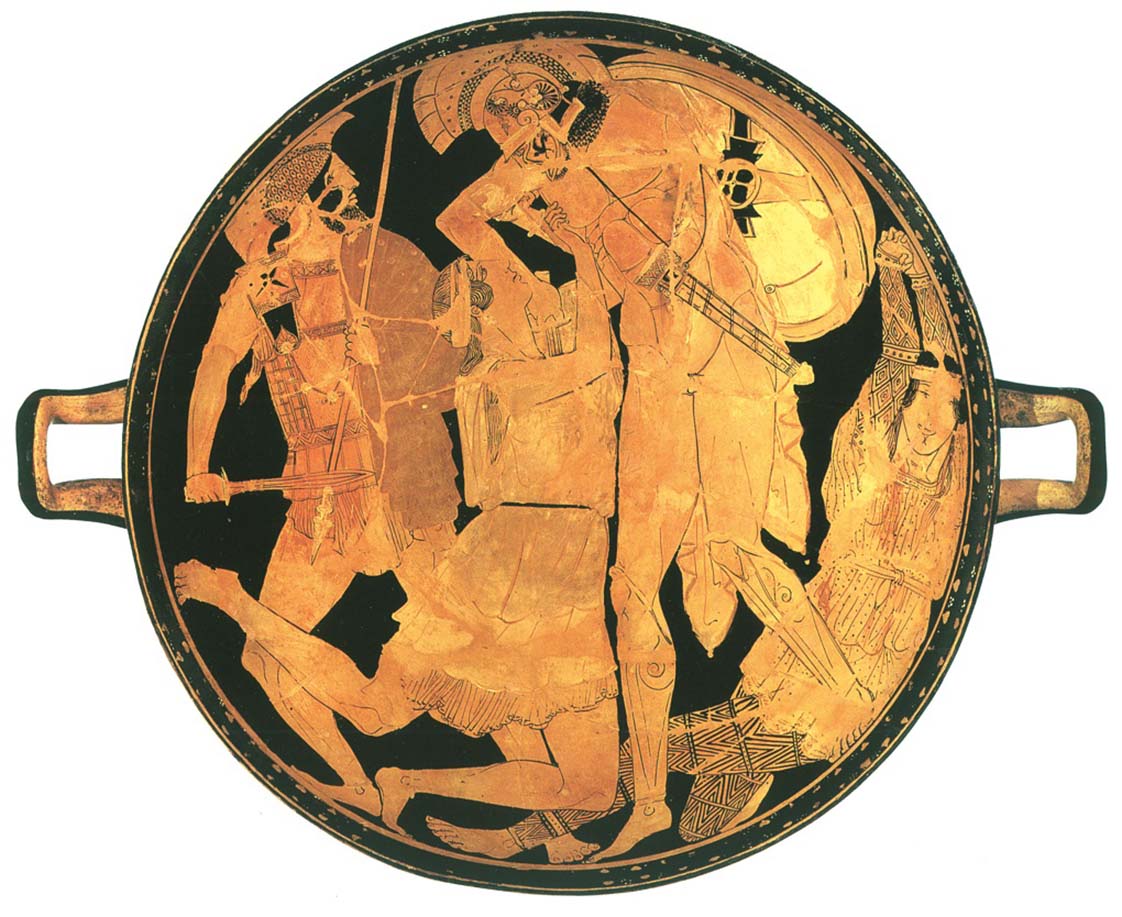
Penthesilea as she appears in the Ancient Sources
In the Epic Cycle
In the five book epic Aethiopis, which was part of the Epic Cycle (or Cycle of Troy) on the Trojan War, the coming to Troy of Penthesilea and Memnon was described in detail. The Aethiopis was published in the 8th century BC and is attributed to Arctinus of Miletus. The main character of the epic is Achilles, who fights Penthesilea and Memnon before he is himself killed.
Although Aethiopis has been lost, the Epic Cycle has been adapted and recycled in different periods of the classical age. The tradition of retelling the epic fall of Troy is indebted to Homer's Iliad and Odyssey, which were grounded in oral story-telling and were only written down when the Greek alphabet was adopted in ancient Greece.
In the Aethiopis Penthesilea is a Thracian woman warrior. She was an Amazon and daughter of Ares, who comes to help the Trojans. She arrived with twelve other Amazon warriors. After a day of distinguishing herself on the battle-field, Penthesilea confronts Achilles.
Achilles kills her, but after taking off her helmet, he falls in love with her. Thersites rebukes Achilles for having fallen in love. Thersites is killed by Achilles, who travels to the island of Lesbos to be purified before returning to Troy and fighting Memnon.
According to Homer, the Trojan king Priam had fought the Amazons in his youth on the Sangarius River in Phrygia, some 350 miles east of Troy. Later writers of the antiquity located Amazons geographically in Anatolia and started an epic tradition where Greek heroes, such as Heracles and Theseus, fought an Amazon warrior of distinction.
The Aethiopis version of the Penthesilea legend has become known as the Homeric tradition.
Finally, different traditions of the Penthesilea legend appear to have existed in the time the Epic Cycle was published. In a lost poem of Stesichorus, believed to have been published in the 7th or 6th century, Penthesilea rather than Achilles had killed Hector.
In the Bibliotheke
In the Pseudo-Apollodorus Epitome of the Bibliotheke she is said to have been killed by Achilles, "who fell in love with the Amazon after her death and slew Thersites for jeering at him".
Lycophron on Penthesilea
In the 3rd century BC Lycophron went against the grain of the Homeric tradition. The poet had been born in Euboea, the site of a shrine to wounded Amazons who had fought in a mythic Battle for Athens. Lycophron tells the story of the young Amazon Clete, Penthesilea's attendant, who had been left behind in Pontus.
Clete sets out with a company of Amazons to search for Penthesilea when she does not return from the Trojan War. The ship with Amazons is swept of course and after a shipwreck on the toe of Italy in Bruttium, Clete becomes the queen of the Amazons that settle there.
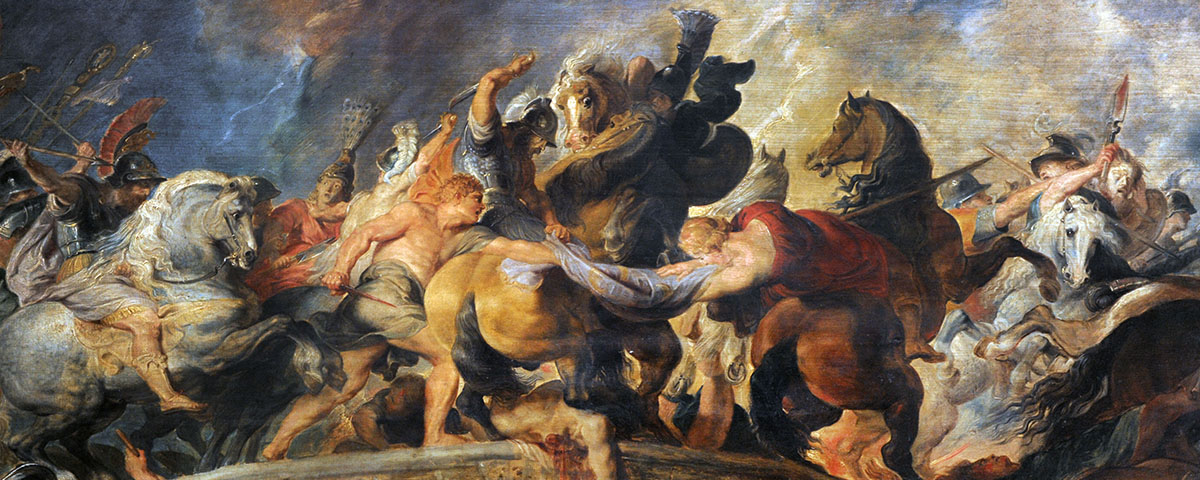
In Virgil's Aeneid
In Virgil's Aeneid, written between 29 and 19 BC, the Trojan army falls back when Achilles advances. Achilles drags the greatest Trojan warrior Hector around the city walls and sells his dead body to king Priam for gold. Penthesilea is cast as a tragic Amazon queen who came too late in vain to help the beleaguered city.
When Aeneas sees the panel of Penthesilea in the Juno temple of Carthage, he knows that the defeat of Penthesilea and Memnon presage a chain of events that would culminate in the sacking of the city. Penthesilea's fate also foreshadows that of Camilla, which is described in detail by Virgil later in the epic. According to Virgil, Penthesilea led an army of Amazons and is a bellatrix (Latin for "female warrior") who dared to fight men (audetque viris concurrere virgo).
Virgil based his narrative in Homer's Iliad, while relying on the Epic Cycle for his portrayal of Penthesilea. Virgil also reworked oral legends into an epic on the foundation of Rome. In Aeneid the Romans descended from the hero Aeneas and Trojan refugees who sailed to Italy after the Trojan War. This interweaving of the Penthesilea legend with the founding legend of Rome can be traced to Lycophron.
In Diodorus' Bibliotheca
In his universal history Bibliotheca historica Diodorus Siculus in the 1st century BC celebrated Penthesilea as the last Amazon to win renown for valour in war. Diodorus wrote that after the Trojan War the Amazons diminished and tales of their former glory began to be considered mere legends.
In Smyrnaeus' Posthomerica
In the 4th century AD the imperial Greek poet Quintus Smyrnaeus made Penthesilea the subject of the first book in Posthomerica. In this epic, Smyrnaeus tries to finish Homer by telling the colourful story of how the city of Troy fell. This work explains how Penthesilea came to be at Troy: Penthesilea had killed Hippolyta with a spear when they were hunting deer; this accident caused Penthesilea so much grief that she wished only to die, but, as a warrior and an Amazon, she had to do so honorably and in battle.
She therefore was easily convinced to join in the Trojan War. Smyrnaeus also describes in gory detail how the army of Amazons surprises the Greek army and the slaughter that commenced. The Amazon Klonie, after slaying her first opponent, is in turn killed. Penthesilea mows through the Greek lines, killing eight warriors, and cuts the arm off the Greek warrior who had killed Klonie. Penthesilea's Amazon comrades Bremusa, Evandre and Thermodosa fight valiantly alongside her but are slain, and so are Derinoe, Alkibie and Derimachea.
Penthesilea slays more Greeks with axe and spear. From the towers the Trojan women watch and Penthesilea inspires the young Hippodamia, who urges the Trojan women to join the battle. Antimachus' daughter Tisiphone gives an inspirational speech: "not in strength are we inferior to men; the same our eyes, our limbs the same; one common light we see, one air we breathe; nor different is the food we eat. What then denied to us hath heaven on man bestowed? O let us hasten to the glorious war!"

In Boccaccio's Famous Women
Between 1361 and 1362 the Italian Giovanni Boccaccio wrote the first collection of biographies in Western literature that was devoted to famous women. The De Mulieribus Claris was published in Latin and dedicated to Andrea Acciaioli, the Countess of Altavilla. According to Boccaccio, Penthesilea succeeded the Amazon queens Antiope and Orithya. She was in strength and skill superior to previous queens. According to Boccaccio, Penthesilea entered the Trojan War against the Greeks to impress Hector.
But Penthesilea and her Amazon troops were slain at the end of a hard-fought battle with the Greeks. After recounting Penthesilea's accomplishments in De Mulieribus Claris Boccaccio wrote that "if we remember that practical experience can change natural dispositions" the legends of the Amazons become plausible. He wrote that "through practice, Penthesilea and women like her became much more manly in arms than those born male" who had been weakened through idleness and love of pleasure.
The notion that upbringing and training were central to gender differences was discussed by Agostino Strozzi and Mario Equicola in 16th century Italy.
In the Middle Ages
In Medieval Europe the Penthesilea legend was developed and recycled, with Achilles fading into the background. In illuminations that illustrated manuscripts, Penthesilea was cast as medieval warrior queen. A tradition developed where Penthesilea entered the Trojan War because of her reverence for the Trojan hero Hector. Penthesilea appears in the Roman de Troie (1160) by Benoît de Sainte-Maure as a chivalric heroine, and through this became part of the medieval genre roman antique, which recycled Greek and Roman myths in a medieval romance context.
In late medieval Europe the legend was further popularised in Christine de Pizan's City of Ladies (1405) and John Lydgate's Troy Book (1420). Penthesilea and Hector became romantic heroes. Penthesilea came to Troy because she had fallen in love with the virtuous knight Hector from afar. Hector and Penthesilea were portrayed as personifications of the ideals of chivalry. When kneeling before Hector's corpse, Penthesilea promises to avenge his death.
Penthesilea fights at the side of the Trojan army, killing many Greek soldiers, but is slain by Achilles' son. In this tradition of the legend, her body is taken to the Thermodon for burial. Along the Terme River various temple burial sites attest to the heroic status Penthesilea had as Amazon queen in the Middle Ages.
In John Gower's Confessio Amanatis she travels to Troy from Pafagoine. She is slain by Pirrus the son of Achilles. Philemenis returned her body for burial. He was rewarded with three fair maidens per year.:iv:2177
Biographical lists of strong women were published, some included Penthesilea. The 1405 Chronicle (known as Haagse handschrift) by the herald Baviere included Penthesilea and the two Amazons Semiramis and Tomyris among the strong women. A Netherlandish list of 101 strong women published between 1465 and 1480 included Penthesilea. This list of 101 women circulated at the court of Mary of Burgundy and was read by members of the Brussels administration. Philippe Bouton in 1480 published a Miroir des dames, which included Penthesilea.
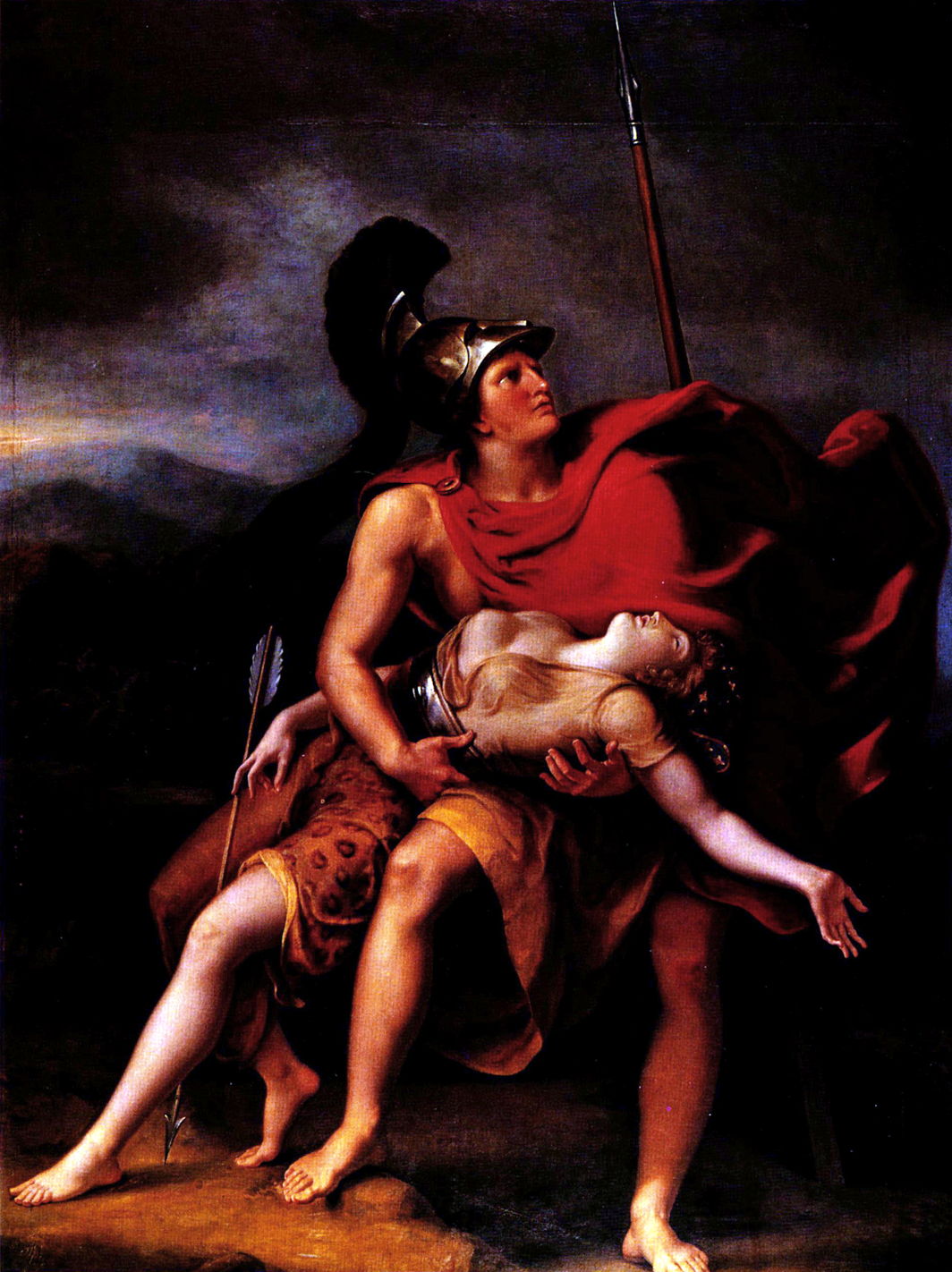
Sources
Homer, The Iliad - Greek Epic C8th B.C.
Epic Cycle, The Aethiopis Fragments - Greek Epic C8th B.C.
Apollodorus, The Library - Greek Mythography C2nd A.D.
Lycophron, Alexandra - Greek Poetry C3rd B.C.
Diodorus Siculus, The Library of History - Greek History C1st B.C.
Pausanias, Description of Greece - Greek Travelogue C2nd A.D.
Quintus Smyrnaeus, Fall of Troy - Greek Epic C4th A.D.
Tryphiodorus, The Taking of Ilias - Greek Epic C5th A.D.
Anonymous, Dictys Cretensis - Greek Faux-Journal C1st A.D.
Anonymous, Dares Phrygius - Latin Faux-Journal C5th A.D.
Hyginus, Fabulae - Latin Mythography C2nd A.D.
Ovid, Metamorphoses - Latin Epic C1st B.C. - C1st A.D.
Ovid, Heroides - Latin Poetry C1st B.C. - C1st A.D.
Virgil, Aeneid - Latin Epic C1st B.C.
Pliny the Elder, Natural History - Latin Encyclopedia C1st A.D.
Seneca, Troades - Latin Tragedy C1st A.D.
"Wikipedia"
"Ancient Origins"
Our Mobile Application
Check out Our Mobile Application "Ancient Greece Reloaded"


